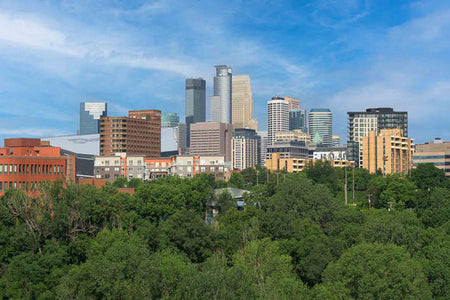- Allergy season in Colorado runs from early spring to fall. Tree, grass, and weed pollen peak at different times.
- The first hard freeze usually ends outdoor allergy season, but indoor allergens like dust and pet dander can still cause symptoms year-round.
- Checking pollen forecasts, following home precautions, and taking prescribed allergy treatments can help you manage seasonal allergies.
Think Colorado’s fresh mountain air means no allergies? Not quite. Even though the state has a dry climate, pollen from trees, grasses, and weeds can still cause allergy problems throughout the year.
The good news? With the right steps, you can still enjoy Colorado’s beautiful scenery—like golden aspen trees in the fall and colorful wildflowers in the spring.
In this article, we’ll explain when allergy season starts, peaks, and ends in 2025, plus tips to help you manage your symptoms.
When is the Allergy Season in Colorado?
Allergy season in Colorado usually starts in late February or early March and can last through summer and into the fall. Different types of pollen peak at different times of the year, which means allergy symptoms can change as the seasons shift.
What are the Worst Months for Allergies in Colorado?
Spring is usually the worst time for allergies in Colorado, but symptoms can last into the summer and fall. The state’s dry, windy climate also spreads pollen far and wide, making it harder to avoid.
In April and May, tree pollen reaches its highest levels in Colorado. Juniper, cottonwood, and aspen trees release large amounts of pollen.
By June, grass pollen becomes the biggest trigger. Late spring and early summer can be tough for allergy sufferers as grasses like Kentucky bluegrass and Timothy grass release pollen into the air.
From August to October, weed pollen takes over, with ragweed being the main culprit. This can lead to a wave of fall allergies, especially on dry and windy days when pollen spreads easily.
When Does Allergy Season End in Colorado?
In Colorado, outdoor allergy season usually ends after the first hard freeze — when temperatures drop below 28°F for several hours [*]. This usually happens between late September and mid-October, depending on where you live and how high up you are.
After the freeze, pollen levels go down, but indoor allergens like dust mites, mold, and pet dander can still cause allergies. This is especially true in the winter when people spend more time inside with windows closed and heaters running.
Sometimes, a warm spell in the fall can bring back a little pollen, especially from ragweed. Windy days can also stir up dust and leftover pollen, making allergies last a bit longer.
Common Allergens in Colorado
Common allergens in Colorado include tree, grass, and weed pollen, as well as indoor allergens that can trigger year-round symptoms.
Common tree pollen in the spring includes:
- Juniper
- Cottonwood
- Aspen
- Elm
- Maple
- Oak
- Pine
- Cedar
Grass pollen in the late spring-summer includes:
- Kentucky Bluegrass
- Timothy
- Bermuda
- Ryegrass
Weed pollen in the late summer and early fall include:
- Ragweed
- Sagebrush
- Tumbleweed
Indoor allergens (year-round triggers):
- Dust mites (common in bedding, carpets, and upholstery)
- Mold spores (found in damp areas like bathrooms and basements)
- Pet dander (shed by cats, dogs, and other furry pets)
How to Prepare for Seasonal Allergies in Colorado
Seasonal allergies can make it tough to enjoy Colorado’s beautiful outdoors. But with the right steps, you can reduce your exposure to allergens and keep your symptoms under control.
Protect yourself during allergy season in Colorado with these tips:
- Monitor pollen levels: Check the daily pollen forecast to know when pollen counts are high. On days with a lot of pollen in the air, try to stay indoors as much as possible, especially if you have bad allergies.
- Keep windows closed: Even though fresh air feels nice, open windows can let pollen into your home. Keep windows shut, especially during peak allergy seasons, to help keep your indoor air cleaner.
- Use HEPA filters: High-Efficiency Particulate Air (HEPA) filters can trap tiny pollen particles. Use them in your home’s HVAC system and air purifiers to reduce the amount of pollen floating in the air.
- Limit outdoor activities during peak times: Pollen levels are usually highest in the early morning and late afternoon. If you want to spend time outside, try to go out in the middle of the day when pollen counts are lower.
- Wear a mask, sunglasses, and hat: A mask can help filter out pollen, sunglasses can protect your eyes, and a hat keeps pollen from sticking to your hair. This is especially helpful on windy days [*].
- Leave your shoes at the door: Pollen can stick to your shoes and get tracked into your house. Taking your shoes off before coming inside can help keep your home free of allergens.
- Shower and change clothes: After being outside, pollen can stick to your skin, hair, and clothes. Taking a shower and changing into fresh clothes helps wash away allergens so they don’t spread around your home.
- Clean regularly: Dust, pollen, and pet dander can build up in your home. Vacuum carpets, wash your bedding in hot water, and dust surfaces often to keep allergens under control.
- Take allergy medications early: If you take allergy medicine, start using it before your symptoms get bad. Some medications work better when taken early in the season. Talk to your doctor about the best options for you.
The Bottom Line
Allergy season in Colorado lasts from early spring through fall. Even after pollen levels drop, indoor allergens like dust and pet dander can still trigger reactions.
The good news? You can manage allergies by checking pollen forecasts, keeping your home clean, and using the right medication.
For fast relief, try Allermi’s combination nasal spray — it works in 10 minutes and is customized to your needs. Stay ahead of allergies and enjoy Colorado’s fresh air!
References:
- NOAA’s National Weather Service. (n.d.). Earliest/Mean/Latest first fall freeze climatology. https://www.weather.gov/dlh/FrostFreezeClimatology
- Seasonal Allergies | Causes, symptoms & treatment | ACAAI Public website. (2022b, November 7). ACAAI Patient. https://acaai.org/allergies/allergic-conditions/seasonal-allergies/









